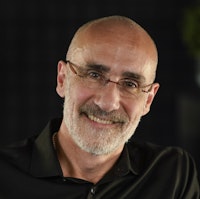
Choose happiness over specialness.
Show Notes
Most of us know where to find quick hits of pleasure and enjoyment. But what about satisfaction that lasts for years, or decades, or a lifetime? It can be tempting to think the secret lies in pursuing more—more money, more accomplishments, more friends, more stuff—but we have overwhelming evidence that more doesn’t work. Maybe the secret is…wanting less? Arthur Brooks teaches classes on happiness at Harvard Business School, and is the author of the New York Times bestseller “From Strength to Strength,” among many other popular books and essays. He draws from the latest research in psychology, neuroscience, behavioral economics, and other disciplines to explain why our biology pushes us to accumulate and pursue but doesn’t have our long-term best interests in mind. The good news is we can circumvent that hard-wiring by shifting our perspectives, pointing in a new direction, and chipping away at what we’ve built up on the outside to find our true selves within.
Explore
Related episodes


Professor Zoe Chance, who teaches the most popular class at the Yale School of Management, illuminates the skills and strategies necessary to improve your natural ability to persuade.


Looking around and experiencing the suffering and injustice in the world can make it difficult to believe that happiness exists. But the Judeo-Christian tradition teaches that it’s sinful to succumb to despair, and we have a responsibility to ourselves and others to try and find our way through dark times. On the other hand, when you avoid suffering, you avoid meaning, and...


We try our whole lives to avoid pain and suffering and when it does show up, we try to solve it. In her new book, No Cure for Being Human, religious scholar Kate Bowler says we try to out-eat, out-learn, and out-perform our humanness. Truth is, bad things do happen to good people and if we're going to tell the truth, we need one another. As someone who lives with cancer, B...


So much of adult life is about learning the rules and then using those rules to navigate the world. We become certain that we know what we know — that we’re right, and we’re safer and more secure that way. But certainty, argues neuroscientist Beau Lotto, might actually be one of society’s biggest sources of emotional and physical unwellness. Certainty causes us to have les...


Are we experiencing a “crisis of connection"?” Fifty-four percent of American adults report that not a single person knows them well. Our political and social divisions are at the forefront of public life right now, and distrust is widespread. New York Times columnist David Brooks is on a mission to spread the skills of deep listening and engaged conversation, which lead t...







